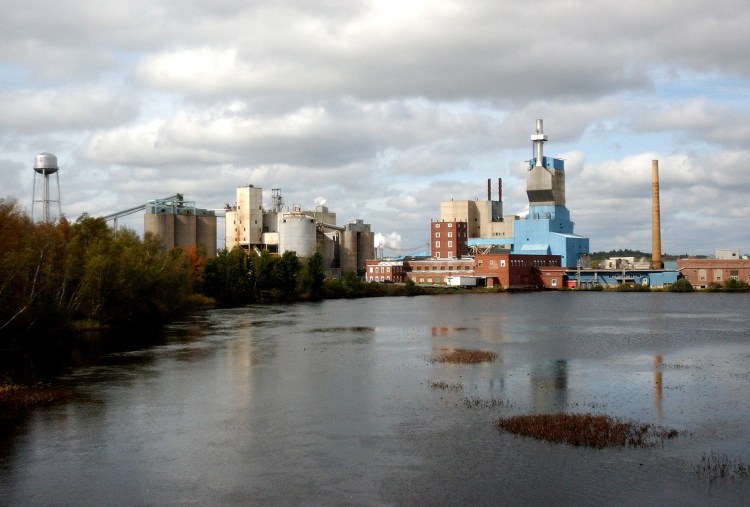A lawsuit filed this week in U.S. Bankruptcy Court alleges that three board members of Lincoln Paper and Tissue pocketed a payout from an insurance company rather than put the money toward repairing a boiler that exploded at the Maine paper plant in 2013.
The lawsuit, filed by unsecured creditors of the bankrupt paper mill, also says the decision to buy pulp and electricity that the impaired boiler had helped produce made the mill unprofitable and ultimately led to a bankruptcy filing a year ago.
The mill in the Penobscot County town of Lincoln was sold at auction in November, reportedly for $5.9 million, to a Boston company that specializes in the liquidation of industrial sites. About 175 mill workers were laid off.
In its bankruptcy filing, Lincoln Paper and Tissue listed hundreds of unsecured creditors. The top 20 were owed an aggregate of more than $5 million.
The suit names the company’s five board members as defendants and alleges that three of them – Keith Van Scotter, CEO of the paper company; John Wissmann, the company’s chief financial officer; and Rod Fisher, a company manager – received cash distributions as a result of settling the insurance claim instead of seeking to have the insurer pay for the repair or replacement of the boiler.
Van Scotter, contacted by phone Thursday, declined to comment.
“I don’t think it’s wise to comment on litigation,” he said. Van Scotter also declined to provide the name of the lawyer or lawyers who will be representing him and the other board members.
Jay Geller, a Portland lawyer who filed the suit on behalf of a committee of unsecured creditors, also declined to discuss the case.
Van Scotter, Wissmann and Fisher were partners in LPT Holding, a separate company that was technically the owner of Lincoln Paper and Tissue. The other two board members, Dan Herring and Douglas Meltzer, are not partners in LPT Holding, and the suit suggests that the pair opposed at least one of the payouts to the holding company that ultimately went to Van Scotter, Wissmann and Fisher.
After the boiler exploded in November 2013, the suit alleges the mill went from making about $1.2 million a month to losing about $2.9 million a month. The boiler had allowed the company to produce its own pulp, rather than buy it on the open market, and to produce about half the electricity needed to operate the mill, according to the suit.
The boiler was covered by insurance, the suit says, that would have paid for the cost of repair, estimated at $32 million.
The suit alleges that board members, meeting a month after the boiler exploded, determined that if they decided to rebuild the boiler, LPT Holding wouldn’t receive any distributions, or payments, from Lincoln Paper and Tissue in 2013 and 2014. But if they negotiated a settlement with the insurer without using the money for repairs, distributions could be made.
In December 2013, the board accepted the insurance company’s settlement proposal of $49.8 million, of which $3 million was issued to LPT Holding and, ultimately, to three of the directors, the suit says.
The board met again in May 2014 and authorized another distribution of $4 million, the suit says. According to the lawsuit, Herring wanted projections to see if the company’s finances supported that additional distribution, but Wissmann and Van Scotter never provided those projections and, by majority vote, the distributions were made.
“At the time, the board knew or should have known that its decisions to accept the (insurance settlement) offer and to distribute a portion of the insurance proceeds to LPT Holding and then to the members of LPT Holding would impair the financial health” of the company, the suit alleges. At that time, the company was facing a potential acceleration of its payments on a $20 million debt held by JP Morgan Chase and also expected higher operational costs. About $6 million of the settlement already had been spent in the immediate aftermath of the explosion, the suit says.
About a year after receiving nearly $50 million in the insurance settlement, the suit says, the company had to seek $6 million in additional financing and then, four months later, the owners looked for a buyer for the mill, but were unsuccessful.
The suit says the board members breached their duty of loyalty to the company by deciding to take the insurance settlement and then make distributions from that settlement.
It alleges that Van Scotter received $1.24 million in distributions during 2013 and 2014, Wissmann received $1.14 million and Fisher received $830,148.
The lawsuit seeks unspecified damages and costs from the board members.
Send questions/comments to the editors.




